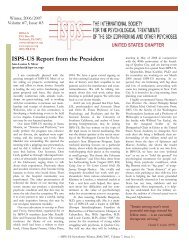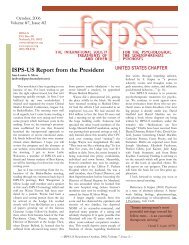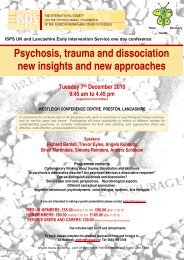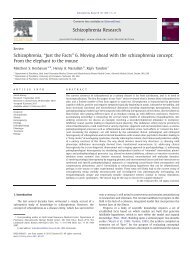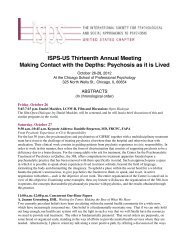Spring 2011 - ISPS-US
Spring 2011 - ISPS-US
Spring 2011 - ISPS-US
Create successful ePaper yourself
Turn your PDF publications into a flip-book with our unique Google optimized e-Paper software.
2<br />
Continued from page 1<br />
Trisha Ready:<br />
What Music Makes of Us<br />
This paper explores whether music can serve as another kind of language, for people who are experiencing psychosis, in the expression of<br />
affect (feeling as released through gesture, movement, or symbol), given that music has been shown to evoke as well as to express emotion.<br />
The paper is based on numerous vignettes from 22 months of daily music listening groups facilitated by this writer on the acute unit<br />
of a Seattle psychiatric hospital. The music groups consist of between 3 to 25 participants listening to a selection of musical pieces, including<br />
participant-suggested music, from classical to hip-hop. When each musical selection ends, participants are asked to respond to the<br />
music. Responses vary from one-word impressions (i.e., “relaxing”) to autobiographical experiences (a Viet Nam veteran recounting a<br />
recurring memory from the war) to metaphorical responses (“ it sounds like waves pounding against a ship”). Numerous participants have<br />
responded with improvised dances, with drawings, or with prose or poetry pieces. One young woman, a new mother who had been admitted<br />
to the hospital with post-partum psychosis, danced increasingly more nuanced dances, centered around the gesture of cradling a<br />
child in her arms. This paper will also explore how music can be socially integrating, and encouraging of community involvement. Recent<br />
studies (Ulrich, Houtmans & Gold, 2007) have shown that music based interventions diminish negative symptoms and improve interpersonal<br />
contact for patients experiencing psychosis. Music is an inexpensive, creative, and sustainable treatment compliment that could help<br />
people with psychosis reintegrate into the community.<br />
Supervision Roundtable<br />
Kristina Muenzenmaier, MD (Chair); Madeleine S. Abrams, LCSW; Dalit Gross, PsyD;<br />
Maia Mamamtavrishvili, MD, PhD; Andres Schneeberger, MD, Liliana Markovic, MD; John Muller, PhD<br />
In this roundtable, panelists will discuss the challenges of both providing and receiving supervision in an environment of increasing<br />
caseloads which often only leaves enough room for pharmacological management. When treating individuals with psychotic liabilities<br />
within this changing environment, finding room for clinical supervision that supports reflection and invites attention to dynamics elements<br />
such as transference/countertransference issues, trauma and vicarious traumatization potentialities, etc., becomes paramount. Panelists<br />
will give preliminary statements describing particular challenges they encounter supervising cases involving psychosis and then invite<br />
attendees into the conversation.<br />
Human Relatedness, Psychosis and Trauma:<br />
The Legacy of Otto Will (panel)<br />
James E. Gorney, PhD (Chair); Beverly C. Gibbons, PhD; M. Gerard Fromm, PhD, ABPP<br />
Otto Will was one of the most creative and influential psychotherapists of the twentieth century. Drawing inspiration from his two analysts,<br />
Sullivan and Fromm-Reichman, from his work with patients at Chestnut Lodge and Austen Riggs, and from the vicissitudes of his<br />
own experience of attachment, separateness and disruption, Dr. Will developed a method of working with profoundly troubled people.<br />
His contribution emphasized the healing power of human attachment and relatedness thirty years before these perspectives became a<br />
staple of clinical theory and practice. This panel will explore his theoretical and clinical legacy utilizing his scholarly papers and first-hand<br />
experiences of his psychotherapeutic genius. In this context, particular attention will be focused upon the impact of Dr. Will’s approach<br />
to treatment within the culture of Austen Riggs.<br />
Psychoanalytic Encounters (panel)<br />
Annie G. Rogers, PhD: Psychosis: A Poetics for the Human<br />
This poetics explores psychosis as a structure of human experience that gives voice to the inaudible and vision to the imperceptible. Lacan’s<br />
understanding of psychosis as a foreclosure of the Name of the Father gives psychoanalysis a unique way to understand the psychotic’s<br />
slippage in language. His concept of the “sinthome” demonstrates that the psychotic may find a supplement for the Name of the<br />
Father through sustained creative work that<br />
influences society. The psychoanalytic clinic<br />
of psychosis created by Willy Apollon,<br />
Daniel Bergeron, and Lucie Cantin of the<br />
Freudian School of Quebec over 25 years<br />
provides a working understanding of what is<br />
at stake in psychosis in relation to human<br />
experience, centering on the psychotic’s<br />
delusional effort to repair what is flawed in<br />
the human in the form of a task or enterprise<br />
pertaining to all the world. As a clinician,<br />
poet, and one who has experienced<br />
psychosis and psychoanalysis as a young<br />
person, the presenter brings a poetics to link<br />
the experience of psychosis to the problem<br />
of humanity. She considers how to make a<br />
space in society for<br />
Continued on page 3<br />
Editor’s Report: .......................................................................................................1<br />
Eleventh Annual Meeting<br />
Table of Contents<br />
Abstracts from the <strong>ISPS</strong>-<strong>US</strong>-Eleventh Annual Meeting: ...........................................1-16<br />
Special Features:<br />
Arizona immigration law response (Joanne Greenberg): .......................................17<br />
Voice Echoes (Michael Eigen): ..............................................................................19-20<br />
I Just Gotta Have A Soul: (Keri Stockton) ............................................................21-22<br />
—<strong>ISPS</strong>-<strong>US</strong> Newsletter: <strong>Spring</strong>, <strong>2011</strong>, Volume 11, Issue 4—



